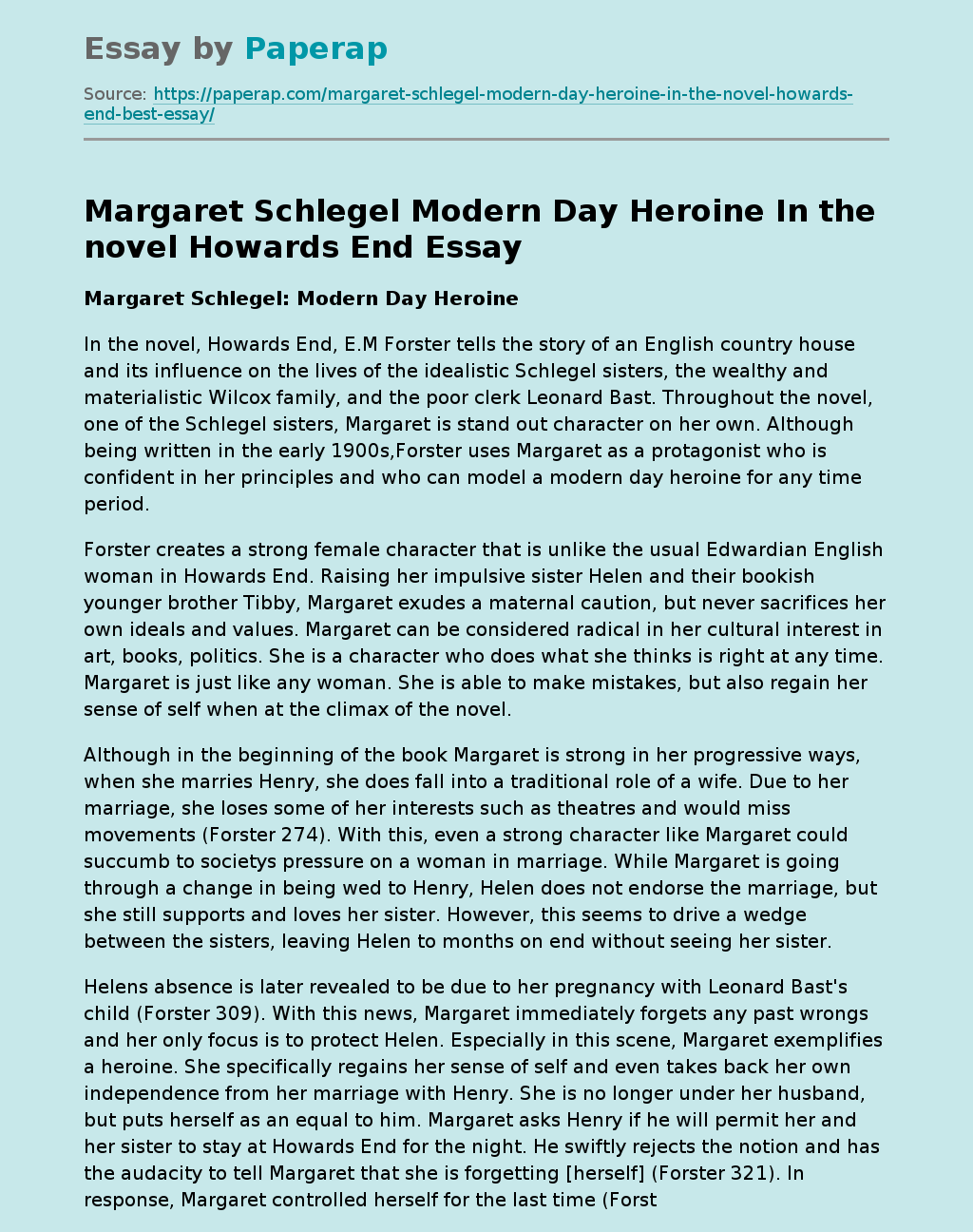Margaret Schlegel Modern Day Heroine In the novel Howards End
Margaret Schlegel: Modern Day Heroine
In the novel, Howards End, E.M Forster tells the story of an English country house and its influence on the lives of the idealistic Schlegel sisters, the wealthy and materialistic Wilcox family, and the poor clerk Leonard Bast. Throughout the novel, one of the Schlegel sisters, Margaret is stand out character on her own. Although being written in the early 1900s,Forster uses Margaret as a protagonist who is confident in her principles and who can model a modern day heroine for any time period.
Forster creates a strong female character that is unlike the usual Edwardian English woman in Howards End. Raising her impulsive sister Helen and their bookish younger brother Tibby, Margaret exudes a maternal caution, but never sacrifices her own ideals and values. Margaret can be considered radical in her cultural interest in art, books, politics. She is a character who does what she thinks is right at any time. Margaret is just like any woman.
She is able to make mistakes, but also regain her sense of self when at the climax of the novel.
Although in the beginning of the book Margaret is strong in her progressive ways, when she marries Henry, she does fall into a traditional role of a wife. Due to her marriage, she loses some of her interests such as theatres and would miss movements (Forster 274). With this, even a strong character like Margaret could succumb to societys pressure on a woman in marriage. While Margaret is going through a change in being wed to Henry, Helen does not endorse the marriage, but she still supports and loves her sister.
However, this seems to drive a wedge between the sisters, leaving Helen to months on end without seeing her sister.
Helens absence is later revealed to be due to her pregnancy with Leonard Bast’s child (Forster 309). With this news, Margaret immediately forgets any past wrongs and her only focus is to protect Helen. Especially in this scene, Margaret exemplifies a heroine. She specifically regains her sense of self and even takes back her own independence from her marriage with Henry. She is no longer under her husband, but puts herself as an equal to him. Margaret asks Henry if he will permit her and her sister to stay at Howards End for the night. He swiftly rejects the notion and has the audacity to tell Margaret that she is forgetting [herself] (Forster 321). In response, Margaret controlled herself for the last time (Forster 321). Henry, in this scene, seems to forget his own wrongdoing with his unfaithful actions with Jacky Bast a decade ago. He does not see that he has sinned just as Helen has. Margaret intends to remind him that he is no different from Helen and she deserves compassion. Margaret even goes on to ask Henry, Will you forgive her-as you hope to be forgiven, and as you have actually been forgiven? (Forster 322). This statement shakes Henry because Margaret is begging Henry to see the connection even if it kills [him] (Forster 322). She will not accept that her husband cannot connect that his wrongs with her sisters are equal, no matter the situation. At the end of the scene, Margaret ignores Henrys refusal to let them stay at the empty house. She defies her husbands wishes and goes to her sister, without fear of the consequences. Margaret is no longer a submissive wife in this scene, but a powerful equal to rival the authoritative Henry. She will not discard her sister even if her husband wants her to. Eventually, at the end of the novel, Margaret does make peace with Henry and he does accept Helen, and even her child. This can show that Margaret standing up to her husband did make a positive impact on everyone’s lives. The only reason this could have occurred was that Margaret rejected societal norms in favor of her sister.
Even though Margaret is caught off guard with the news of her sisters pregnancy, it is her refusal to reject her sister that once again reveals that societal ideals and family issues are not specific to Edwardian England, even if the situations have changed. It could no longer result in exclusion from society, but the double standard remains. There is still stigma around single motherhood and sexual relations outside of marriage. It may not be controversial to support womens suffrage, but there are plenty of people who look down on any woman willing to make waves on political matters. It could be a question of divorce, but the demand of equality in marriage, of forgiving as one has been forgiven, that is not achieved in many cases. Margaret, especially in the scene discussed earlier, can convey that her actions and her love for her sister can be seen even in todays society.
In Forsters novel, the Schlegel family can be seen as symbols that represent the progressive attitudes of a swiftly changing England era in which the novel was written. If the Schlegel family were to be written today, they could even be considered as a modern family, with Margaret the matriarch. Margaret embodies a modern day woman who is interested in more than conventional roles of her time. She is interested in culture, equality, and discussions. Forster uses Margaret as a mouthpiece to be an idol for many women to look towards, no matter the time period. She is a timeless character who loves and who forgives, but never lets anyone over power her willingness to do right, making her an infinite icon in literature.
Margaret Schlegel Modern Day Heroine In the novel Howards End. (2019, Dec 06). Retrieved from https://paperap.com/margaret-schlegel-modern-day-heroine-in-the-novel-howards-end-best-essay/

